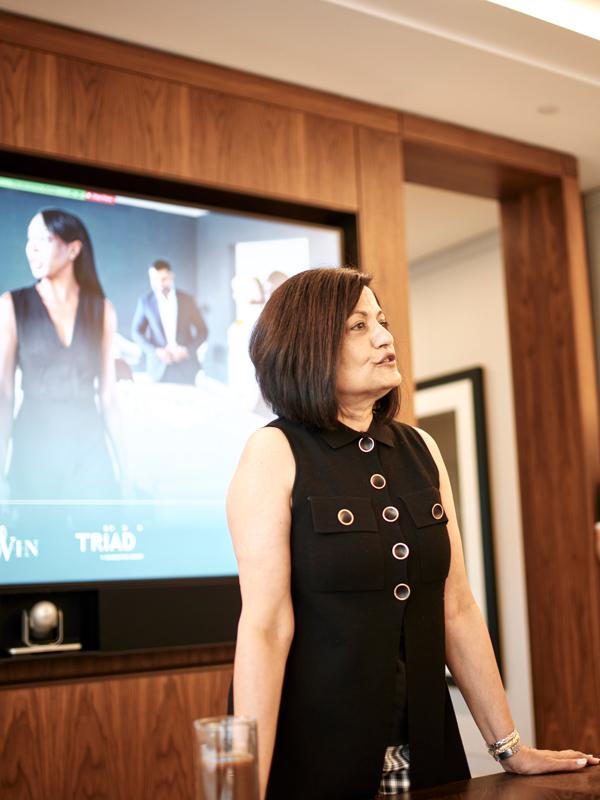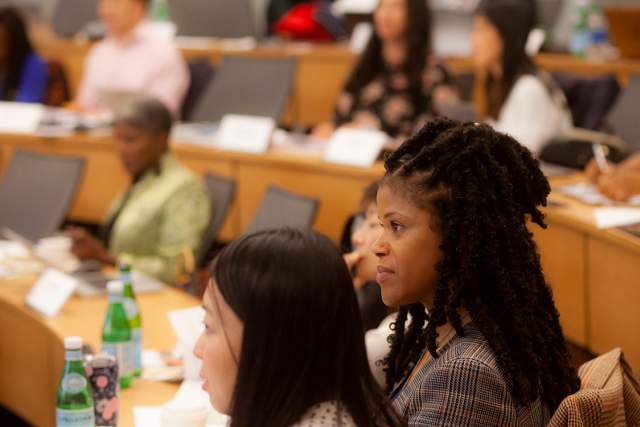During her tenure as the Senior Associate Dean of Advancement, Punam Keller got to meet many influential alumni who wanted to support Tuck’s mission to develop wise leaders who better the world through business. It was rare, however, for alumni to ask what her own goals were, and how she wanted to leverage her time in the dean’s office to achieve them.

In her research in support of the program, Tuck’s Punam Keller found that women need better opportunities to explore the private equity industry during their career search, a host of policies that support them while at work, and inclusive teams that improve mentorship and office culture.
That, in essence, is what Charlie Ayres T’87 inquired about in the fall of 2020. For Keller, who is an expert in behavioral change and in marketing health, wealth, and the arts, the answer was obvious: gender equity. Ayres, the managing partner and chairman of Trilantic North America, a private equity firm, shared that he had a similar goal and had formed a council at Trilantic North America to advance gender equity there.
According to a study by McKinsey & Company, Trilantic North America’s efforts toward gender equity are highly needed. The report found that in the private equity industry gender parity for promotions is lacking at all steps in the pipeline up to the managing director role, and the number of women in the uppermost roles, particularly in the C-suite, continues to be minute.
Trilantic North America is a bit of an outlier, however, as it has a long history in advocating for gender equity in upper management. We’ve had wonderful success backing female-led portfolio companies for more than a decade,
Ayres says, and we have increased the number of female professionals at our firm and continue to believe that having diverse voices around the decision-making table leads to better results.
Still, the industry and Trilantic North America have much work to do on the issue.
Toward that end, Ayres invited Keller to join the Founders Council, and since early 2021 Trilantic North America and Tuck have partnered to develop an executive education program that will help private equity firms increase the representation of women at senior levels in the industry. The Gender Equity Consortium, as it is called, is an invitation-only program offered in January in New York that uses data-driven methodologies that emphasize awareness, action, and accountability, assisting firms in finding the most prominent barriers to gender equity and the most effective solutions. It’s a multi-year commitment that aims to empower firms to not only change their policies, but also their culture.
[We] continue to believe that having diverse voices around the decision-making table leads to better results.
—Charlie Ayres T’87
Keller did not make that commitment on a whim. She explained to Ayres that she would need to conduct rigorous research—in the form of in-depth interviews with stakeholders, focus groups, and surveys—and then analyze the data, share it with Trilantic, and use it to put together a curriculum specifically tailored to the challenges the industry is facing. Ayres agreed to that approach and made a generous gift to the school to facilitate the program’s creation.
Keller’s research has many actionable findings. In general, she found that women need better opportunities to explore the private equity industry during their career search, a host of policies that support them while at work, and inclusive teams that improve mentorship and office culture. The program is a forum where participants can determine how those findings apply to them, if at all, and what to do about it. We identified the biggest challenges and the biggest solutions,
Keller says, and we encourage firms to see which barriers and solutions are most relevant to them.
The consortium is a one-and-a-half-day program that’s designed to illuminate the factors that create a gender disparity in private equity and to push all members of each participating firm to advance gender equity through their allyship. As such, the participating firms will commit to the program’s gender equity challenge,
identifying one policy or initiative within their organization, tracking its success, and reporting back to the consortium. Tuck will use the information to create a repository of case studies on advancing gender equity in the industry.
The curriculum will feature an introductory session with Keller where she shares reasons why 2023 is the best time to initiate a gender equity plan in firms and presents the challenges and solutions from her study on gender equity in the private equity sector. During a later session, Keller will present a methodology to help participants jump-start a gender equity program in their organization.
In a following session, Tuck professor Adam Kleinbaum will discuss his framework for organizational change, and how leaders can manage organizations during times of transformation. He does this through two case studies: one that illustrates how organizations are complex systems that require careful and broad changes when making the environment more hospitable to women; and another that shows how the Federal Reserve Bank of San Francisco used a holistic approach to improve diversity, equity, and inclusion.
The program will also have interactive sessions with Stacy Lennon, a coach and trainer at Triad Consulting. Grounded in relevant research on gender and negotiation, the sessions will focus on how gender stereotypes affect everyday workplace conversations and decisions, giving attendees a chance to share their experiences, explore strategies to combat the negative impacts of stereotypes, and identify concrete next steps to implement at their firm.
We need to keep reminding people that there is no tradeoff. We can provide a more equitable environment for women without hurting the men in the industry, and without undermining profits.
—Adam Kleinbaum
A fourth component of the program will feature Neely McNulty and Elizabeth Mattison, curators at the Hood Museum of Art at Dartmouth, who will work with participants to engage with works of art to foster careful observation and critical thinking. McNulty and Mattison will guide participants through discussions of works of art to consider the ways in which analysis and conclusions are impacted by bias; use collective inquiry to promote divergent thinking and multifaceted strategies for analysis; and engage in a critical thinking process that embraces multiple, rather than binary, meanings.
Recent research has shown that women on investment teams make a significant and positive impact on firm performance, especially in emerging markets. Unfortunately, that message hasn’t gotten through to many people in the financial industry. The Gender Equity Consortium, above all, is chance to reinforce it.
We need to keep reminding people that there is no tradeoff,
Kleinbaum says. We can provide a more equitable environment for women without hurting the men in the industry, and without undermining profits.

